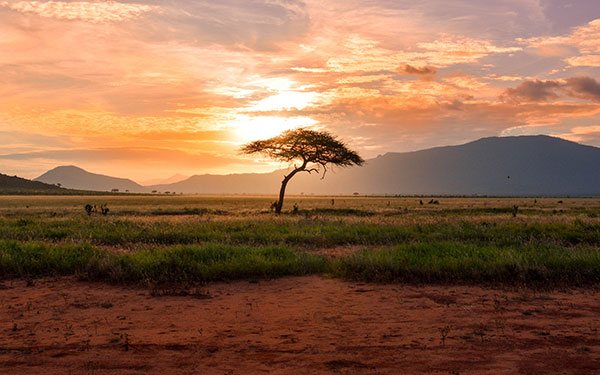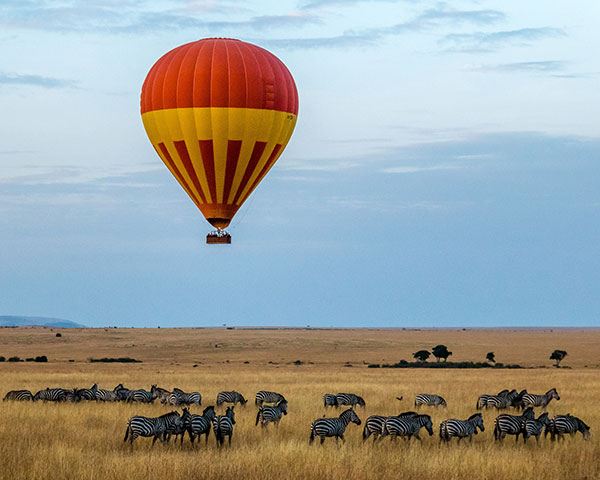Are you considering moving to Kenya from the UK?
Nobody would blame you.
Famous for endless Savannah sunsets and a wilderness filled with majestic wild beasts, snow misted mountains, and traditional tribe cultures, magical Kenya is a romantic and intriguing country that has been attracting westerners for decades.
But what is it like to live there?
Increasing numbers of expats are making Kenya their home, and if you’d like to join them we’ve put together this guide packed with everything you need to know about moving to Kenya…
Contents
Kenya Visa Requirements for Brits
Visiting
UK passport holders need to obtain a visa to enter Kenya — even for a short visit. A visitor’s visa can either be applied for in advance online via the e-visa website, or directly on arrival at your destination airport.
A single entry visa costs £30 and is valid for up to 3 months.
If after this time you wish to extend your time in Kenya, it’s possible to get an extension to the tourist visa for up to another 90 days at the immigration offices in Nairobi.
Working
In order to live and work in Kenya it’s necessary to apply for a work permit.
This can be done either before you leave the UK or whilst you are in Kenya on a tourist visa, but you must have a work permit before you can start work.
These can be applied for via the Department of Immigration Services website. However it should be noted that the Kenyan government will only give out a work permit to a foreign national if the post they are applying for cannot be given to a Kenyan applicant.
Most Brits obtain the Class D permit, which allows them to work in a specific role with a specific employer, which means you will need to have your job lined up and approved before you make your application.
Permanent Residency
Any British citizen wanting to stay in Kenya for more than 90 days must register with the immigration department or local police department as soon as possible after arrival.
Once you have been working in the country for at least 7 years on the correct work permit, and provided you have been there continuously for the previous 3 years, you may apply for permanent residency.
In order for your application to be successful, you must be able to show how you will benefit the country in regard to socio-economic development.
Highly skilled professionals or those able to make large financial investments are given priority.
Way of Life in Kenya
Lifestyle
Founded on traditional tribal cultures, Kenya is a rich and vibrant country with an emphasis on the natural environment, but the modern world is ever more present.

There is no question that Kenya is stunning, exciting, and exotic, but as with anywhere there are both pros and cons to living here.
Expats in Kenya have the advantage of being able to explore some of the most magnificent landscapes in the world — including beautiful white sand beaches, lush forests and parks bursting with wildlife — whilst living a low cost lifestyle and enjoying Kenya’s melting pot of diverse cultures.
In the cities the expat social scene is buzzing, and there is increasingly greater social interaction with the locals too as English is widely spoken.
There are some great restaurants, bars and nightclubs, but there is less choice than you may be used to, and there are sometimes restrictions on alcohol.
Certain foods are expensive, and the choice of clothes and electrical goods in shops is limited.
That said this is not the UK, and some expats do experience culture shock when arriving in Kenya.
There is a large amount of poverty in rural areas and certain city areas, and crime rates in the big cities are high — particularly muggings, car jacking, and theft.
As a result many expats choose to live in gated communities with hired security, and can sometimes feel a little isolated. Sadly there is also a terrorism risk here — including terrorism targeted at westerners — and the Inspector General of the Kenyan Police has called on the public to adopt a higher level of vigilance and report any suspicious people or activity straight away.
The main terrorism threat is from extremists linked to Al Shabaab, a militant group in Somalia opposed to the Somali government.
Getting Around
With some much to explore in Kenya, it’s a good job that getting from place to place is relatively easy. There are good domestic flight networks which offer a comfortable and affordable way to cover long distances.
An alternative for long distance travel is making the journey by bus, but this can be haphazard as there they don’t always stick to timetables.
That said, bus travel is very cheap — but do keep a close eye on your personal belongings.
Long distance train travel is limited, but there are good train links serving the main cities, many with park and ride facilities.
There are decent sleeper trains available on some long distance routes.
Matatus are privately owned minibuses and often offer express services around and between towns and cities, but they do have a poor road safety record.
Another option in town are private taxis or tuk tuks, but they aren’t metered so be prepared to haggle for a good price before you set off.
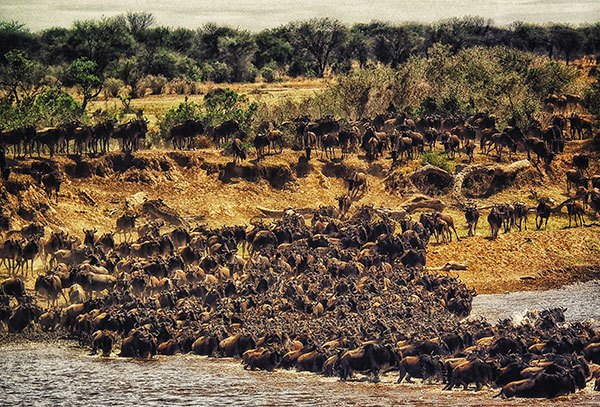
Driving in Kenya
Kenyans have a ‘no rules’ approach when it comes to driving, so if you decide to hire a vehicle you need to expect the unexpected.
In addition to the generally poor standard of driving, road conditions outside of the cities can also be dangerous, with lots of bumps and potholes in the road surface, and dirt roads should not be attempted without a 4×4.
Although Kenyans officially drive on the left, drivers will generally choose whichever side of the road has the safest surface, so be vigilant and drive slowly.
City drivers are aggressive, and you will have to be confident if you want to get anywhere. A good option whenever possible is to hire a car with an experienced driver.
Weather in Kenya
Being so vast and with such diverse topography, the climate in Kenya varies depending on the location. Coastal areas and the city of Mombasa are humid with high temperatures (an average of 27°C) almost all year round, whilst to the north the climate is arid with very little rainfall and average temperatures anywhere between 20°C to 40°C.
In the west the weather is hot and humid, with regular evening rainfall, as well as bright sunshine.
The central highlands around Nairobi are slightly cooler, with average temperatures of between 11°C to 26°C, with the weather being pleasant most of the year, but with a rainy season from March to May.
Cost of Living in Kenya
Many UK expats in Kenya find that their employment contracts cover some lifestyle expenses, with allowances for things such as school fees, transport, healthcare and rent, but not taking that into account, here’s a general guide to the cost of living in Kenya…
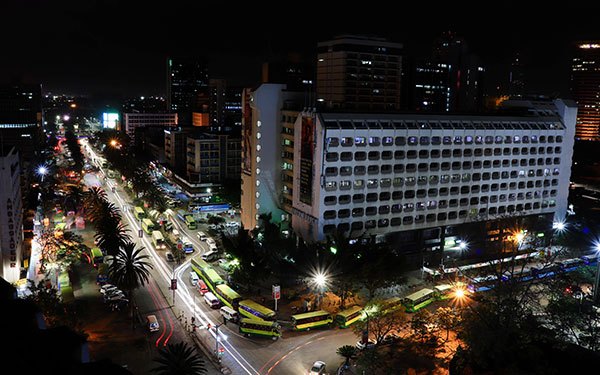
Lifestyle
When it comes to the weekly shop, it’s best to stick to locally produced food and groceries which are much cheaper than anything imported. Clothes and electrical goods can also be expensive.
If you prefer to eat out the same rules apply — western style restaurants can be found but can be costly, certainly in comparison to one of the many local restaurants dishing up tasty delicacies for next to nothing.
Alcohol can sometimes be pricey — particularly in a swanky city nightclub.
Transport is generally affordable, but costs can rack up quickly if you need to hire a car and driver regularly.
Here’s a closer look at how pricey life in Nairobi can be:
Rent
Most expats living in Kenya spend roughly one third of their monthly income of rent and utilities.
It’s also worth bearing in mind that if like most expats here you choose to live in an upmarket gated community or townhouse you will also have additional security costs to pay.
For obvious reasons rent is higher in the city than in rural areas. The price of utilities can also be fairly high – including clean water and electricity.
Healthcare
The quality of healthcare in Kenya is lower than that in the UK, and varies wildly from place to place.
Although there is a public health system in place, expats are strongly advised to take out private healthcare insurance in order to gain access to more competent, well trained doctors and nurses, and better, more modern facilities.
In addition, if you don’t pay into the national healthcare system and are without private health insurance, you can expect to pay western style prices for medical care.
Your health insurance policy should include a repatriation clause for medical purposes, so that in the case of an emergency you can be flown to South Africa to benefit from state of the art medical treatment available there.
Expect to pay anywhere between £800 and £1700 per year for a quality comprehensive health insurance policy.
Schooling
If you’re living in Kenya with kids, you may find your choice of location being heavily influenced by the schools available in that area.
Except from certain establishments in major cities, government schools are largely underfunded and suffer from a lack of qualified teachers.
Most expats make the choice to send their children to one of the country’s international schools which offer a high standard of education and follow a UK style curriculum.
Depending on the school you decide upon, fees can vary between £1000 all the way up to £8000 per year for one child.

Popular Areas for Brits
Nairobi
Probably the only city in the world to be able to boast its very own national park, Nairobi is a treat for those who like to blend nature with city life.
Kenya’s capital is a vibrant place, glittering and gritty in equal measure. Although it might not always be beautiful there are fabulous nightclubs, bars, restaurants and shopping malls can be found here, and with so much nature just on its doorstep it’s no wonder that thousands of expats call Nairobi home.
Mombasa

In Mombasa cultures clash to create an intoxicating cosmopolitan city rich in history and with a unique, exotic ambience.
Surrounded by the warm waters of the Indian ocean, in Mombasa you can down cocktails on the beach at sunset, go dolphin spotting or deep sea dive, wander the winding streets dotted with mosques and temples, or lose yourself in the heady scents and sights of local markets.
Kisumu
Rising up from the shores of Lake Victoria in western Kenya, Kisumu is a pleasant, laid back port city bursting with charm.
There are a wealth of nature activities nearby, mostly based around the unique wetland ecosystems nearby, and the fun loving locals are always ready to welcome you with a smile.
Nakuru
An up and coming town in Kenya’s Great Rift Valley, Nakuru is often overlooked, but its location between Lake Nakuru National Park and the extraordinary volcanic landscapes of the Menengai crater offers up fantastic opportunities for nature lovers.
It’s surprisingly energetic and lively too, with plenty of bars and clubs and one of the best markets in Kenya.
Kilifi

Perhaps one of the prettiest towns in Kenya, recent years have seen Kilifi transformed into a haven for ecologists and conservationists.
Tourism here is low key, keeping it a largely undiscovered and peaceful destination with glorious beaches and a totally chilled atmosphere perfect for relaxation.
Eldoret
Situated on the route between Kenya and Uganda, Eldoret is the economic heart of the far west, and a bustling university town.
There are many attractions nearby including hiking and visiting the tea plantations in the beautiful Nandi Hills, and there are plenty of good places to eat drink and dance too.
Jobs in Kenya for British Expats
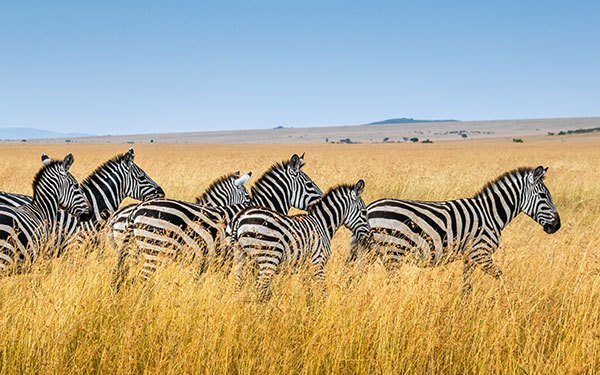
Despite a growing economy, levels of unemployment in Kenya are still fairly high, and preference is given to native Kenyans over foreigners for any given job.
Having said that there are ever increasing numbers of international companies offering work, particularly in agriculture, teaching, tourism, banking manufacturing, IT, and real estate sectors.
Brits wanting to work in Kenya can stand a good chance of getting hired provided that they are highly skilled in their sector, and manage to secure a Kenyan sponsor and / or offer of work before arrival on African soil.
Still considering a move to Kenya from the UK?

